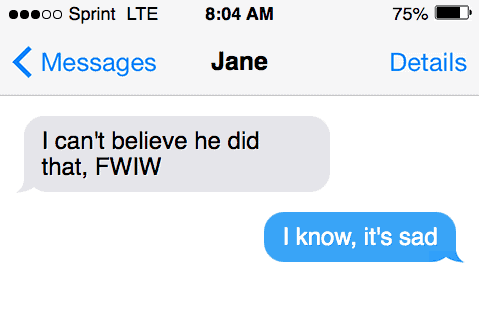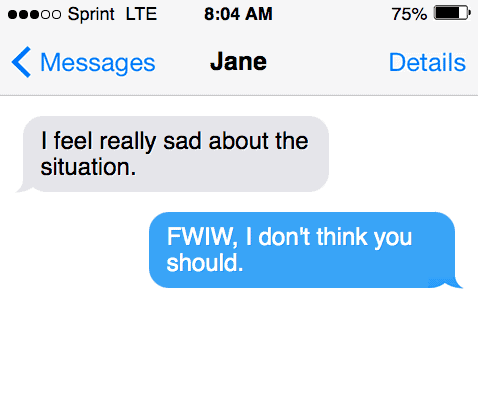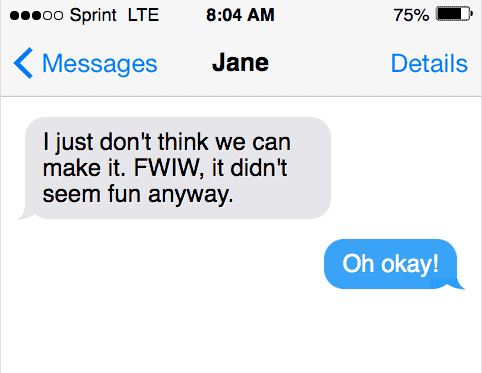What does “FWIW” mean? The internet slang acronym “FWIW” can be confusing to understand. It can get used at the start of a sentence, end, or middle of a sentence. When someone texts, “FWIW,” what are they trying to communicate?
Learn what “FWIW” means in this short guide…
“FWIW” meaning and definition
“FWIW” stands for “For What It’s Worth.” This is an acronym that is used when someone is sharing an opinion about a subject, event, or scenario. It is used when a person wants to share a differing view on a subject without sounding aggressive.
Typically, “FWIW” is used to soften opinions and share a viewpoint without aggravating the person they are having a conversation with.
“FWIW” is a type of initialism. It doesn’t typically have other meanings of the acronym aside from, “For What It’s Worth.”

Similar acronyms that are used:
IMO: In My Opinion
IMHO: In My Honest Opinion (Or “In My Humble Opinion)
Capitalization
Commonly, “FWIW” is either in ALL CAPS or all lowercase letters.
Correct example: FWIW
Correct example: fwiw
Incorrect example: FWiw
Incorrect example: fWiW
Intention (synonyms)
The intention of the abbreviation and phrase is to politely disagree:
- To disagree.
- To share an opinion.
- To have a differing view.
Usage
Most commonly, “FWIW” will get used in messages between two people.
When “FWIW” is used at the beginning of a sentence, it is considered a prepositional phrase. It is used to politely tell readers that you’re about to contradict a point of view.
Platforms “FWIW” could get used:
Social media: Snapchat, Instagram, Facebook, TikTok, and more.
Text messages: Group chats and direct SMS conversations.
Internet: Message boards, forums, and Discord channels.

History of “FWIW”
The acronym “FWIW” has gone as far back as 2013, according to Urban Dictionary. With Google Trends showing the acronym gaining in popularity since 2020. The cause of the growth in popularity could be due to the growing disagreement of political and sociopolitical challenges in the United States through those years.
Since the use of “FWIW” dates back to 2003, this is considered one of the acronyms from “early days” of the internet. Similar to abbreviations like “LOL” or “OMG.”
The sharing of opinions in a snarky tone dates back to early 1800s. With Newton Foster’s “The Merchant Service” saying from one character to another, “Your opinion goes for what it’s worth—nothing.”
Examples of “FWIW” getting used in a conversation
Here are example conversations with the vocabulary “FWIW” getting used on a conversation.
Example one
Friend 1: “I can’t stand how Mr. Anderson always wants us to write papers on English.”
Friend 2: “FWIW, I think it’s going to be a pretty fun assignment.”
In this example, one friend is sharing a strong opinion. While the other friend is sharing another point of view. Rather, asking for consideration on another perspective the friend could have.
Example two
Friend 1: “I can’t stand it when you do that bad habit, FWIW. Yeah, IDK, FWIW.”
Friend 2: “Well, I don’t care what you think. It doesn’t matter to me. Sorry!”
This second example is a similar message as the first example. Although, the friend is using “FWIW” to share an aggravation that they are feeling. The “FWIW” acronym, in context, is getting used to soften the perspective.
Instead of getting used at the beginning of a sentence, it is getting used at the end of one.

Similar short forms and abbreviations
Other acronym definitions that are related to “FWIW”:
IIH: “If I’m Honest.”
IMO: “In My Opinion.”
IMHO: “In My Honest Opinion (Or “In My Humble Opinion)”
FYI: Or “For Your Opinion.”
Sources
- FWIW – Wiktionary
- FWIW – Urban Dictionary
- Fwiw Definition & Meaning – Dictionary.com
- Knowledge : Abbreviations & Meaning
Inside this article
Fact checked:
Content is rigorously reviewed by a team of qualified and experienced fact checkers. Fact checkers review articles for factual accuracy, relevance, and timeliness. Learn more.
Core lessons
Glossary
- Abstract Noun
- Accusative Case
- Anecdote
- Antonym
- Active Sentence
- Adverb
- Adjective
- Allegory
- Alliteration
- Adjective Clause
- Adjective Phrase
- Ampersand
- Anastrophe
- Adverbial Clause
- Appositive Phrase
- Clause
- Compound Adjective
- Complex Sentence
- Compound Words
- Compound Predicate
- Common Noun
- Comparative Adjective
- Comparative and Superlative
- Compound Noun
- Compound Subject
- Compound Sentence
- Copular Verb
- Collective Noun
- Colloquialism
- Conciseness
- Consonance
- Conditional
- Concrete Noun
- Conjunction
- Conjugation
- Conditional Sentence
- Comma Splice
- Correlative Conjunction
- Coordinating Conjunction
- Coordinate Adjective
- Cumulative Adjective
- Dative Case
- Determiner
- Declarative Sentence
- Declarative Statement
- Direct Object Pronoun
- Direct Object
- Diction
- Diphthong
- Dangling Modifier
- Demonstrative Pronoun
- Demonstrative Adjective
- Direct Characterization
- Definite Article
- Doublespeak
- False Dilemma Fallacy
- Future Perfect Progressive
- Future Simple
- Future Perfect Continuous
- Future Perfect
- First Conditional
- Irregular Adjective
- Irregular Verb
- Imperative Sentence
- Indefinite Article
- Intransitive Verb
- Introductory Phrase
- Indefinite Pronoun
- Indirect Characterization
- Interrogative Sentence
- Intensive Pronoun
- Inanimate Object
- Indefinite Tense
- Infinitive Phrase
- Interjection
- Intensifier
- Infinitive
- Indicative Mood
- Participle
- Parallelism
- Prepositional Phrase
- Past Simple Tense
- Past Continuous Tense
- Past Perfect Tense
- Past Progressive Tense
- Present Simple Tense
- Present Perfect Tense
- Personal Pronoun
- Personification
- Persuasive Writing
- Parallel Structure
- Phrasal Verb
- Predicate Adjective
- Predicate Nominative
- Phonetic Language
- Plural Noun
- Punctuation
- Punctuation Marks
- Preposition
- Preposition of Place
- Parts of Speech
- Possessive Adjective
- Possessive Determiner
- Possessive Case
- Possessive Noun
- Proper Adjective
- Proper Noun
- Present Participle
- Prefix
- Predicate



